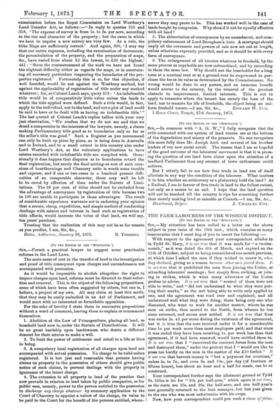(To THE EDITOR OF THE SPECTATOR:l SIR,—Permit a practical lawyer
to suggest some practicable ,reforms in the Land Laws.
The main cause of cost in the transfer of land is the investigation and proof of title consequent upon charges and encumbrances not accompanied with possession.
As it would be impossible to abolish altogether the right to impose charges upon land, reforms must be directed to their reduc- tion and removal. This is the object of the following propositions, some of which have been often suggested by others, but one is, I believe, a project of my own. All may claim at least this merit, that they may be easily embodied in an Act of Parliament, and would meet with no interested or formidable opposition.
For the sake of brevity I state them in successive propositions without a word of comment, leaving them to explain or recommend themselves.
1. Abolition of the Law of Primogeniture, placing all land, as leasehold land now is, under the Statute of Distributions. It will be no great hardship upon landowners who desire a different descent for their estates to make a will.
2. To limit the power of settlement and entail to a life or lives in being.
A compulsory local registration of all charges upon land not accompanied with actual possession. No charge to be valid unless registered. It is but just and reasonable that persons having claims on property in the possession of others should give public notice of such claims, to prevent dealings with the property in ignorance of the latent charge.
4. The extension to all property in land of the practice that now prevails in relation to land taken by public companies, or for public uses, namely, power to the person entitled to the possession to discharge any charge whatever by summary application to the Court of Chancery to appoint a valuer of the charge, its value to be paid to the Court for the benefit of the persons entitled, whom-
soever they may prove to be. This has worked well in the case of lands bought by companies. Why should it not be equally effective with all land?
5. The abbreviation of conveyances by an amendment, and com- pulsory enforcement of Lord Brougham's Acts. A mortgage should imply all the covenants and powers of sale now set out at length, unless otherwise expressly provided, and so it should be with every form of conveyance.
6. The enlargement of all tenures whatever to freehold, by the same process as copyholds are now enfranchised, and by extending to them the same law. Why should not the leaseholder for a long term at a nominal rent or at a ground-rent be empowered to pur- chase the fee at its value as determined by the Commissioners. No wrong would be done to any person, and an immense benefit would accrue to the country, by the removal of the greatest obstacle to improvement, limited interests. This is not to apply to tenancies where the tenant has merely the loan of the land, nor to tenants for life of freeholds, the object being an uni-






































 Previous page
Previous page